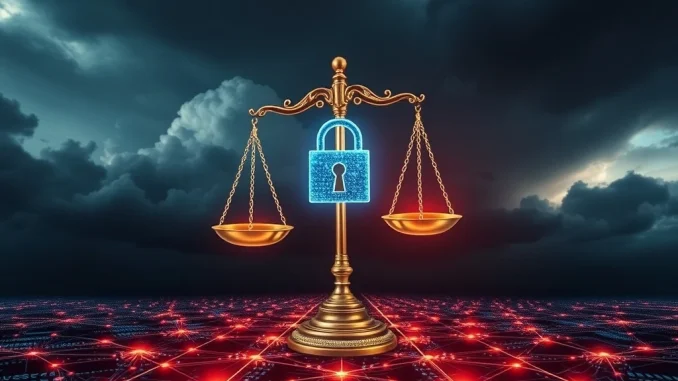
The digital asset world is buzzing with a development that could fundamentally reshape how venture capital firms operate within the decentralized finance (DeFi) ecosystem. The U.S. Department of Justice (DOJ) is dramatically expanding its DOJ crypto enforcement efforts, turning its gaze towards Dragonfly Capital, a prominent venture capital firm. This isn’t just another regulatory hurdle; it’s a significant escalation stemming from Dragonfly’s past investment in Tornado Cash, a crypto mixer infamous for its links to sanctions evasion.
Understanding the Escalation in DOJ Crypto Enforcement
For years, the U.S. Department of Justice has been steadily increasing its focus on the cryptocurrency space, initially targeting direct perpetrators of illicit activities. However, this latest move signals a pivotal shift. The DOJ is now extending its reach to entities that might have indirectly facilitated such activities through investments, even if those investments were made years ago and under different regulatory understandings. This proactive stance underscores a broader strategy to bring traditional financial compliance frameworks into the often-unregulated frontiers of Web3.
- Broader Scope: Moving beyond direct actors to include investors and facilitators.
- Proactive Approach: Not just reacting to crimes, but scrutinizing potential enablers.
- Signaling Intent: Sending a clear message that no part of the crypto ecosystem is immune from scrutiny.
The Heart of the Matter: The Dragonfly Capital Investigation
The core of this unfolding drama is the Dragonfly Capital investigation. Dragonfly, a well-known name in crypto venture capital, made an investment in Tornado Cash back in 2021. The DOJ’s current scrutiny follows the August 2023 indictment of Tornado Cash, which was accused of enabling transactions for sanctioned entities, most notably North Korea’s Lazarus Group. The DOJ is reportedly poring over Dragonfly’s internal communications and Know-Your-Customer (KYC) protocols from that period.
Dragonfly has publicly defended its position, asserting that it conducted thorough due diligence and complied with all regulatory requirements at the time of its 2021 investment [1][2]. This defense hinges on the principle that regulatory expectations evolve, and firms should not be held retroactively liable for actions compliant at the time. However, the DOJ’s deep dive aims to ascertain if Dragonfly executives played any role in or exerted influence over Tornado Cash’s operations that could be construed as complicity or negligence.
The Shadow of Tornado Cash Sanctions
To fully grasp the gravity of the Tornado Cash sanctions, it’s essential to understand its role. Tornado Cash was a decentralized cryptocurrency mixer designed to enhance transaction privacy by obscuring the origin and destination of funds. While privacy tools have legitimate uses, mixers like Tornado Cash became a favored tool for illicit actors, including cybercriminals and sanctioned state-sponsored groups, to launder stolen funds and evade sanctions.
The U.S. Treasury Department’s Office of Foreign Assets Control (OFAC) sanctioned Tornado Cash in August 2022, citing its role in laundering over $7 billion worth of cryptocurrency since its inception, including significant sums for the Lazarus Group. This sanction was a landmark moment, marking the first time a decentralized protocol was sanctioned, sparking intense debate about the nature of decentralization and accountability.
Redefining Accountability: DeFi Investor Liability
Perhaps the most profound implication of this case lies in its potential to redefine DeFi investor liability. Traditionally, investors are generally not held responsible for the misuse of products or services by end-users, especially if their investment was passive and compliant with existing laws. However, the DOJ’s current approach suggests a paradigm shift, where venture capital firms might be held accountable for indirect complicity in regulatory violations if their investments fund platforms that later facilitate illicit activities.
Key Questions Arising from This Shift:
- Due Diligence Scope: How far must a VC firm go in vetting a DeFi project, especially one offering privacy features?
- Ongoing Monitoring: Are investors expected to continuously monitor the usage of their portfolio companies’ technologies?
- Influence vs. Control: What level of influence over a decentralized protocol constitutes culpability?
This case is forcing a re-evaluation of risk management strategies for all institutional investors in the DeFi space. The legal ambiguities inherent in decentralized finance, where traditional compliance frameworks like AML and KYC often struggle to apply, are now being aggressively addressed by authorities.
Traditional vs. DeFi Investment Scrutiny
Let’s compare the typical scrutiny levels:
| Aspect | Traditional Investment (e.g., SaaS) | DeFi Investment (e.g., Mixer) |
|---|---|---|
| Primary Focus | Financial viability, market fit, corporate governance. | Technological innovation, decentralization, tokenomics, *potential for illicit use*. |
| Liability Scope | Direct operational negligence, fraud, financial misrepresentation. | Direct actions, *and now potentially indirect facilitation of illicit activity*. |
| Regulatory Framework | Well-established corporate, securities, and financial laws. | Evolving, often ambiguous, applying traditional laws to novel tech. |
| KYC/AML Burden | Primarily on financial intermediaries and regulated entities. | Challenging for decentralized protocols; burden now extending to investors. |
Setting a New Crypto Legal Precedent
The outcome of the crypto legal precedent set by the Dragonfly Capital investigation will reverberate throughout the entire Web3 ecosystem. If the DOJ successfully establishes culpability for Dragonfly, it could compel venture capital firms to adopt significantly stricter vetting criteria and ongoing monitoring for their portfolio companies, particularly those involved with privacy-enhancing technologies or decentralized autonomous organizations (DAOs). This could, in turn, stifle innovation in the decentralized finance space, as promising but potentially risky projects struggle to secure funding.
Conversely, a successful defense by Dragonfly could reinforce the argument that investors cannot be held responsible for the downstream misuse of their investments by end-users, provided they conducted due diligence and complied with regulations at the time of investment. This would preserve a degree of flexibility for funding emerging technologies, allowing innovation to flourish without the constant specter of retroactive liability.
This legal battle highlights the fundamental tension between fostering innovation in decentralized systems and enforcing regulatory clarity. Courts are grappling with the complex challenge of applying traditional legal frameworks to distributed and often opaque systems, where governance is distributed and traditional intermediaries are absent.
What Does This Mean for the Future of DeFi?
The DOJ’s narrowed focus on crypto enforcement, exemplified by the Tornado Cash case, underscores the increasing regulatory risks facing the industry. The legal proceedings will undoubtedly influence future investment practices, compliance protocols, and the delicate balance between innovation and oversight in Web3 technologies.
For investors, this case serves as a stark reminder to:
- Enhance Due Diligence: Go beyond technical and financial checks to include thorough regulatory and compliance risk assessments, especially for projects with privacy features.
- Monitor Regulatory Landscape: Stay abreast of evolving regulations and sanctions lists.
- Re-evaluate Portfolio Risks: Assess existing investments for potential indirect exposure to sanctioned entities or illicit activities.
With Dragonfly’s defense centered on compliance at the time of investment, the case may hinge on whether courts accept retroactive interpretations of regulatory expectations. This key question will shape the sector’s evolution, potentially dictating whether decentralization remains a haven for innovation or becomes a minefield of unforeseen legal liabilities.
Conclusion
The DOJ crypto enforcement action against Dragonfly Capital over its Tornado Cash ties marks a critical juncture for the cryptocurrency industry. It signifies a profound shift in regulatory strategy, extending accountability to investors and redefining the boundaries of liability in decentralized finance. The outcome will not only determine Dragonfly’s fate but also set a crucial crypto legal precedent, influencing how future investments are made, how compliance is approached, and ultimately, the trajectory of innovation in the Web3 space. All eyes are on this case as it navigates the complex interplay of technology, law, and global finance.
Sources:
[1] [Dragonfly Capital Faces U.S. Investigation Over Tornado Cash Investment]
[2] [Storm Warning as DOJ Targets Dragonfly in Tornado Cash Trial]
[3] [Dragonfly Defends Tornado Cash Investment Against DOJ Scrutiny Cites Regulatory Compliance]
Frequently Asked Questions (FAQs)
Q1: Why is the DOJ investigating Dragonfly Capital?
The DOJ is investigating Dragonfly Capital because of its 2021 investment in Tornado Cash, a decentralized crypto mixer that was later sanctioned for facilitating transactions with North Korea’s Lazarus Group and other sanctioned entities. The investigation aims to determine if Dragonfly executives played a role in or influenced Tornado Cash’s operations despite asserting compliance at the time of investment.
Q2: What is Tornado Cash and why was it sanctioned?
Tornado Cash was a decentralized cryptocurrency mixer designed to enhance transaction privacy. It was sanctioned by the U.S. Treasury Department in August 2022 because it was extensively used by illicit actors, including sanctioned groups like the Lazarus Group, to launder billions of dollars in stolen cryptocurrency and evade sanctions.
Q3: What are the potential implications of this investigation for DeFi investors?
This investigation could significantly redefine investor liability in DeFi. If Dragonfly is found culpable, it might compel venture capital firms to adopt much stricter due diligence and ongoing monitoring for their portfolio companies, particularly those involved in privacy-enhancing technologies. It signals that investors might be held accountable for indirect complicity in regulatory violations.
Q4: How does this case relate to DeFi investor liability?
This case is a landmark in the discussion of DeFi investor liability. It challenges the traditional view that investors are not responsible for end-user misuse. The DOJ’s focus on Dragonfly’s financial ties and internal communications suggests a new standard where funding platforms that later facilitate illicit activity could lead to legal repercussions for investors, even if their initial investment was deemed compliant.
Q5: What is the significance of this case for crypto legal precedent?
The outcome of this case will set a critical crypto legal precedent. It will help clarify how traditional anti-money laundering (AML) and sanctions laws apply to decentralized systems and who bears responsibility when such systems are misused. A ruling against Dragonfly could deter future investments in certain DeFi sectors, while a ruling in its favor might reinforce limited liability for passive investors, shaping the future balance between innovation and regulation in Web3.



